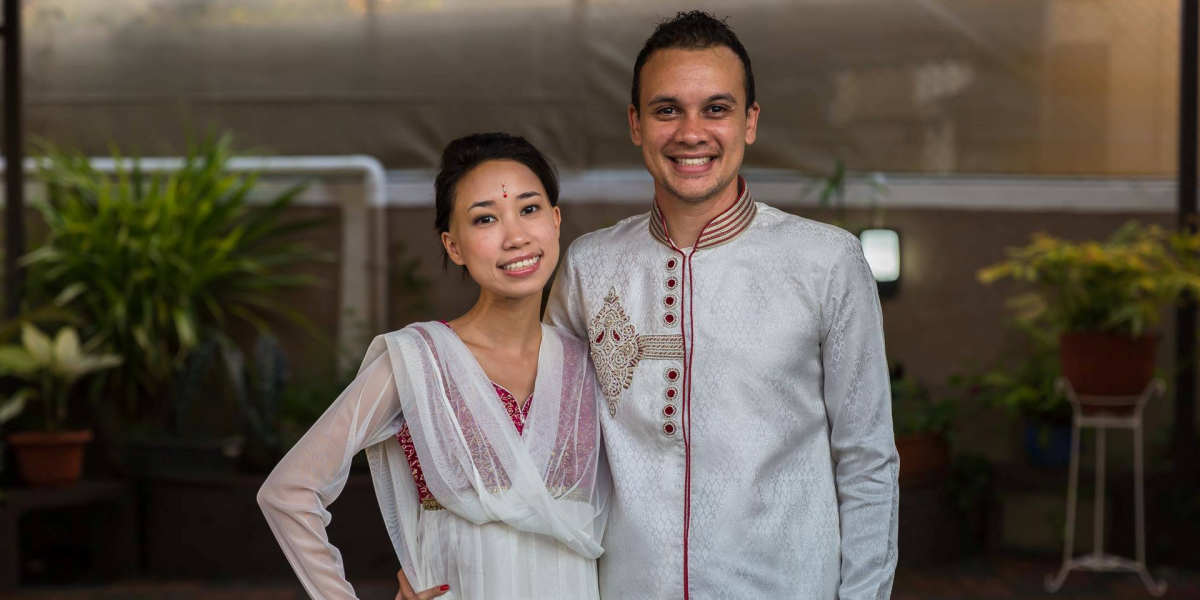
Before completing her Master's in Non Profit Administration in San Francisco, Kelly was working in both the corporate and government sectors of Singapore, her home country. Two years ago, what was supposed to be a short-term visit to her husband's mother land, Mauritius, opened their eyes to the flaws of the local food system. Ever since, they have focused on developing a sustainable farming model in Mauritius with international applicability. Kelly speaks to Expat.com about the unexpected change in the course of her life and how she feels about Mauritius, her new home.
Hi Kelly, please introduce yourself. Where are you from, what are you doing in Mauritius, and what were you doing before you arrived?
Hello! I am from Singapore, lived in California for a few years, and now I am the co-founder of Farmcity, a startup that builds modern farms for healthier communities. Before I arrived to Mauritius, I was in San Francisco, studying Nonprofit Administration and working with nonprofits in the Bay Area.
What brought you to Mauritius?
My move to Mauritius was serendipitous. My husband is Mauritian, and we were in Mauritius on holiday, spending time with his family. While we were here, a series of events – the lack of healthy produce in the supermarkets, the inaccessibility of organic produce, the rains that tripled the price of vegetables – opened our eyes to how flawed our food system is. It became this problem we couldn't ignore, so we decided to scrap all our plans to ‘settle' in Singapore and to move here to start Farmcity instead. In the blink of an eye, it has already been almost two years since we moved here.
What is the process of moving to Mauritius?
Based on my experience, you will need to apply for a Residence Permit of a Mauritian Spouse at Sterling House by submitting a whole set of documents including your Birth Certificate, Marriage Certificate, and a Certificate of Morality. Note that all documents will need to be legalized by a competent authority such as the Ministry of Foreign Affairs of your birth country or bear the seal of Apostille of the Hague Convention of 5th October 1961 – originals included. Once all documents have been submitted, you have to wait for a call back to inform you of the status of your application. The wait can take as long as 90 days (sometimes longer), so if you need an extension on your visa pending issuance of your Residence Permit, you can apply for it at the passport extension office at Sterling House.
What is your favourite thing about Mauritius, and what is your least favourite?
My favourite thing about Mauritius is probably the impossible-to-define Mauritian hospitality. There is always a celebration, and everyone goes out of their way to make you feel welcome. People are full of warmth and laughter. Even when there is a cyclone rolling through and the power is out, Mauritian homes will still be filled with the warmth of laughter and freshly cooked faratas and kari poul (flatbread and chicken curry).
My least favourite thing is probably the bureaucracy and the lack of accountability that permeates it. It means having to wait months on end for a simple permit; having to deal with multiple officers and retelling your story multiple times; being shuffled between different departments without speaking to anyone who can provide a reasonable solution. It is the norm, so everyone will tell you, “C'est Maurice! This is Mauritius!”
How would you describe Mauritius in one sentence?
Mauritius is a country booming with potential, but you have to have patience.
What has surprised you the most about Mauritius?
In some commercial areas such as Rose Hill, Quatre Bornes, and Curepipe, shops close around noon on Thursdays. A Mauritian told me that this is because in the olden days, merchants had to close their shops to go to the port to collect their goods on Thursday afternoons. Not sure how true that is!
You and your husband have started your own company, Farmcity. How is today's entrepreneurship in Mauritius?
It is such an exciting time for entrepreneurship in Mauritius because the entrepreneurship scene is pretty nascent, so there are still plenty of opportunities waiting to be exploited; and yet there are already a number of incubators and co-working spaces all around the island. This is not to say it would be easy to be an entrepreneur here – it isn't, and there is much to be improved in terms of infrastructure and access to local and international markets. What could be prototyped and tested in say six months in a mature market, could easily take up to two years here. Startups also need to face the reality that the local market is very small, so anything that they develop needs to be scalable beyond Mauritius. But if it was easy, everyone would be doing it and there would be saturation. It is definitely still a very exciting time to jump on the entrepreneurship train.
What change do you want to make in Mauritius with Farmcity?
We want to make healthy, naturally-grown food accessible to everybody, regardless of their income level. We believe that that can be achieved in two parts: by bringing farms closer to the people so that everybody can eat local produce, which makes food more affordable and fresher, and by creating the next generation of "agripreneurs". With the current generation of farmers retiring with little to no succession plans, the need for more farmers to grow the food we need in a sustainable manner is acute. The Farmcity model enables anyone to set up a Farmcity, even without an agricultural background and independent from arable land.
How do you find the lifestyle in Mauritius?
Mauritius is calm and has a much slower pace than other places. No one is in too much of a hurry, which can get frustrating at times if you are trying to run a business, but perfect for a holiday or retirement.
How is the transportation system in Mauritius? How do you move around?
Public transport is not very reliable and it is not a very ‘walkable' country, so I rely a lot on my husband to drive me around. It helps that we work together. If you are able to drive, I think you will find it easy to get around.

How is everyday life for you in Mauritius?
My days are mostly spent on the farm and with my dogs. The day-to-day differs quite a bit – it could be anything from showing visitors around the farm, tending to our crops, conference calls and meetings to get the business up and running.
Do you feel that you have adapted to your new life?
Maybe 80%. After two years here, I still do not speak French, and while I understand Creole (the dialect that locals speak), I still cannot converse in it. But I have my ‘go-to' places for groceries, a haircut, and have even built up a directory of places for good local food.
What new habits have you developed in Mauritius?
I've become a morning person now, perhaps because we run a farm, but also probably because there is not much to do after 9pm.
And what old habits have you quit in Mauritius?
Shopping because mostly everything is imported and therefore expensive. I have also quit movies because there is probably only one showing a week in English, and hanging out till late with friends, since most places do not stay open late.
What is your opinion on the cost of living in Mauritius?
I think the cost of living in Mauritius is pretty high relative to average salaries here. Rent is cheap compared to other places, but the daily expenses do add up. A baguette may cost you only Rs10 (USD 0.30c) but a bowl of noodles at a food court is about US$6. The basic groceries per month for a couple is about US$300. Vegetable prices fluctuate widely – a pound of tomatoes could cost as much as US$5. A t-shirt is about US$20.
What is something that you would like to do in Mauritius but haven't had the opportunity to do yet?
Probably to live and explore Mauritius as a tourist. We've been so busy setting up Farmcity, and past visits have always been a whirlwind trip of ten days or less.
Share your most memorable experience in Mauritius.
Probably when Cyclone Berguitta went past Mauritius. I had never experienced a cyclone so when the weather reports warned that Berguitta was on its way, I couldn't help but panic. I couldn't understand how Mauritians could remain so jovial about it. But before I knew it, Berguitta had passed and all was calm again. It is so memorable because it was such a non-event.

If you could do the move to Mauritius all over, what would you do differently?
Leave the expectations behind. I think visiting the country on vacation is very different than living here, more so than other countries.
What do you think of the local cuisine? What are your favourite dishes?
I love it! My favourite is boulettes (the local version of dumplings). I also love the cooking of my in-laws – dholl, farata, and gratin arouille.
What do you miss the most about your home country?
Definitely the safety and convenience of Singapore – you can get most things done with just a few clicks online, places stay open late (sometimes even 24 hours), so there is always stuff to do and see.
Have you had a moment where you almost felt like leaving Mauritius?
Many times actually. I think the sixth month after moving here was the hardest because the ‘honeymoon period' was over and reality set in. I began to question if I had made the right decision and to wonder how it could possibly be the right decision when after six months I was nowhere near to what I set out to do due to delays that were beyond my control. I think the best way to overcome that is to always go back to the reason you decided to move to a new country, and realize you are not alone in feeling that way. Meet with other expats here as well as returning Mauritians, and they will all have their own ‘adjustment stories' to share.
Can you give some useful tips that soon-to-be expatriates in Mauritius might benefit from.
Pack a taste of home to get you through the homesickness. Permits and papers, wifi connectivity, and banking can take weeks, sometimes months. That's normal, so if you realize it early on, it will save you a lot of frustration. It is easier (and faster) to call someone to get the information you need than email. Sometimes products have a different price on the shelf than when it is scanned at checkout, especially in supermarkets, and especially when they are on sale. Check your receipts and take a picture with the product barcode and displayed price so there is less confusion at checkout.
What are your plans for the future?
We want to scale Farmcity to the rest of the island, but also take the concept to Singapore and other cities in the near future.
What is one thing that you will take with you from Mauritius?
Lessons in resilience and grit.




















